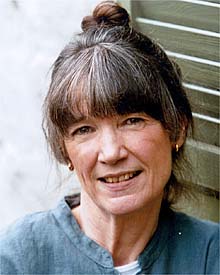Featured New Authors
Featured Author: Anne Tyler

Featured Author: Anne Tyler
From the Archives of The New York Times
In This Feature
Recent Links
Audio
(19 min.)
 Diana Walker/Alfred A. Knopf |
| Anne Tyler |
(1964)
“This is an exceedingly good novel, so mature, so gently wise and so brightly amusing that, if it weren’t printed right there on the jacket, few readers would suspect that Mrs. Tyler was only 22.”
(1965)
“In ‘The Tin Can Tree,’ Miss Tyler has selected material slight enough to be controlled completely, and squeezed more emotional power from it than one would have thought it contained.”
(1970)
“[Tyler’s] ear for demotic dialogue is as accurate as an Ampex and her estimate of middle-class America is low enough to have pleased [Ring] Lardner himself.”
(1972)
“Miss Tyler fills her pages with other richly-idiosyncratic characters who amble about in Chekhovian fashion. . . . Gentle charm is the author’s stock in trade. Her characters have so much of it one wishes their story
had more substance.”
(1974)
“Anne Tyler is especially gifted in the art of freeing her characters and then keeping track of them as they move in their unique and often solitary orbits. Her fiction is filled with displaced persons who persist stubbornly
in their own destinies.”
(1975)
“Less perfectly realized than ‘Celestial Navigation,’ her extraordinarily moving and beautiful last novel, ‘Searching for Caleb’ is Tyler’s sunniest, most expansive book.”
(1977)
“‘Celestial Navigation’ (1974) and ‘Searching for Caleb’ (1976) were more satisfying novels. But a taste of Anne Tyler, once acquired, is a splendid addiction.”
(1980)
“Miss Tyler, witty, civilized, curious, with her radar ears and her quill pen dipped on one page in acid and on the next in orange liqueur, is asking whether art is adequate to the impersonations life insist on, death absolves.
She is a wonderful writer.”
(1982)
“Funny, heart-hammering, wise, [the book] edges deep into truth that’s simultaneously (and interdependently) psychological, moral and formal — deeper than many living novelists of serious reputation have penetrated,
deeper than Miss Tyler herself has gone before.”
(1985)
“‘The Accidental Tourist’ is one of Anne Tyler’s best books . . . . In her patient investigation of [the struggles between semiattentive males and semiobsessed females], Miss Tyler has produced a very satisfying
body of fiction.”
(1988)
“Anne Tyler, who is blessedly prolific and graced with an effortless-seeming talent at describing whole rafts of intricately individualized people, might be described as a domestic novelist, one of that great line descending
from Jane Austin. . . . Ms. Tyler is at the top of her powers.”
(1991)
“In many ways [‘Saint Maybe’] is Anne Tyler’s most sophisticated work, a realistic chronicle that celebrates family life without erasing the pain and boredom that families almost necessarily inflict upon
their members.”
(1995)
“[Tyler] does nothing fancy, nothing tricky. But so rigorous and artful is the style without a style, so measured and delicate is each observation, so complex is the structure and so astute and open the language, that the
reader can relax, feel secure in the narrative and experience the work as something real and natural — even inevitable.”
(1998)
“. . . a novel that repays our always delighted attention . . . Real reconciliation does not arrive within the pages of this wonderful novel, but the reader is invited to glimpse a future in which its inhabitants will grope
their way toward mutual forgiveness.”
(1976)
“[Oates’s] stories tremble on the brink of breakdown, with their bursts of anguished phrases torn by dashes and elliptical dots, her characters (outwardly prim, controlled, well-groomed, remote) may hurtle into madness
at any moment.”
(1977)
“Marilyn French has written a collective biography of a large group of American citizens. Expectant in the 40’s, submissive in the 50’s, enraged in the 60’s, they have arrived in the 70’s independent
but somehow unstrung, not yet fully composed after all they’ve been through.”
(1977)
Anne Tyler, mother of two and author of seven, resents being referred to as a housewife who writes. In this interview, Tyler explains her writing process and how she keeps it from conflicting with her personal life.
(1978)
Tyler calls Paul Theroux’s book “vibrant and compelling.” Less exotic than most of his work, “Picture Palace” draws its power from the “slow evolution of character.”
(1978)
Tyler calls McEwan “a skillful writer, absolutely in control of his material,” but finds his characters so hopeless that it’s hard to enjoy the book.
(1980)
Visiting Welty’s house in Jackson, Miss., Tyler talks with Welty about a collection of her short stories.
(1986)
Tyler considers the continuing appeal of Virginia Lee Burton’s children’s book about a house that becomes overwhelmed by urban development. Tyler says the book “comforts that group of individuals whose lives are
rearranged willy-nilly when they don’t expect it and they don’t understand the reasons for it.”
(1989)
Tyler won the Pulitzer Prize for “Breathing Lessons.”
Source link


